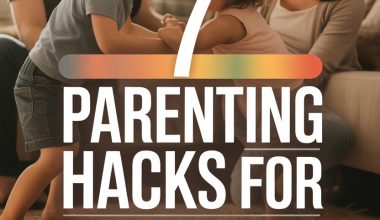Ever felt like your last ounce of peace was left in the bottom of a half-drunk coffee cup you reheated three times and never actually finished? Welcome, kindred spirit.
Raising small humans is a full-body, full-soul sport, and somewhere in the chaos, it’s all too easy to lose track of your own emotional boundaries, needs, and joys.
But here’s the good news: emotional independence isn’t just for people who meditate daily and say things like “my truth.” Ordinary, over-caffeinated parents can get it back, too.
Why Emotional Independence Matters
Let’s clear something up: emotional independence isn’t about being stoic or shutting out your kids’ feelings.
It’s about knowing where you start and your children (and partner, and dog, and school WhatsApp group) end. It’s the art of responding rather than absorbing.
Think: less emotional sponge, more human being with waterproof lining.
Becoming emotionally independent again means rediscovering your own needs, regaining the ability to say “no” without guilt-induced sweats, and—here’s a wild concept—feeling happy that isn’t 100% linked to whether everyone else in the house is currently smiling.
Identifying Where You Lost the Plot
Remember when you had opinions on music, a favourite snack, dreams about future travel?
If your only dream now involves uninterrupted sleep, you might be too emotionally enmeshed with the tiny dictators you love most.
Start by asking yourself:
- Do my mood swings depend entirely on my kids’ moods?
- Do I apologise for having needs?
- Can I make a decision for myself without consulting every family member, the school Facebook group, and a minimum of three parenting blogs?
If you answered “yes” to any of those, join the club. Awareness is the first step—unless you’d rather just keep eating cold toast and pretending you love Bluey as much as your child does.
Boundaries Aren’t Just for Toddlers
Firm boundaries are not the exclusive territory of playgrounds and bedtime routines. You need them, too.
Boundaries could mean telling your partner you need 20 minutes alone after dinner, or refusing to answer work emails during family time. This isn’t selfish—unless you think putting on your own oxygen mask before assisting others makes you a villain.
For more on how boundary-setting improves parent wellbeing, check out this research brief from the University of Illinois.
Practice saying, “I love you, but I’m not available for that right now.” If this sentence causes you to break out in hives, start smaller: “I’ll help you after I finish my tea.” Progress, not perfection.
Let Go of Guilt—It’s Not a Family Heirloom
Parental guilt is as common as lost socks. The trick is to stop passing it around the family like a dodgy fruitcake.
You are not responsible for everyone’s happiness at every moment. Your kids can survive a little disappointment—honestly, they might even benefit from it.
Psychologists suggest that children learn resilience and empathy when their parents express authentic feelings and needs (NLM). Translation: you’re not damaging them by wanting a bit of space.
Next time guilt pipes up, imagine it as a foghorn: loud, persistent, but easy to ignore with practice. Or at least, easier.
Rediscover the Things That Make You… You
Once upon a time, you had hobbies. Possibly even interests that didn’t involve glue sticks.
Pick one tiny thing that used to delight you—music, books, gardening, painting, or just lying very still with your eyes closed—and schedule it, even if it’s only five minutes.
It feels strange at first, like wearing proper trousers after a year in joggers. But after a while, it’ll start to fit again.
Apps like Headspace, Calm, or Duolingo (for those who fancy learning Spanish while reheating coffee) offer gentle ways to reclaim a bit of personal time. Technology does have its uses beyond Peppa Pig reruns.
Find Your Voice—And Use It, Loudly or Softly
Speaking up for yourself is not the same as shouting everyone down.
Sometimes it’s about calmly stating, “I’d like to shower alone today.” Other times, it’s sharing with your partner that you’re struggling and need backup.
If you’ve developed the parental habit of saying yes to everything, try the ancient art of the pause.
When someone asks something of you, breathe. Wait. Then answer.
Turns out, the world won’t combust if you don’t immediately volunteer for the PTA bake sale. Miraculous.
Dr. Brené Brown often talks about the power of vulnerability and clear communication. If you need a pep talk, her podcasts and books are a goldmine.
Embrace the Joy of Missing Out
There’s a reason #JOMO (Joy of Missing Out) exists. It’s the glorious feeling of declining that third birthday party invite, switching your phone off, or ignoring the group chat drama about the Year 3 disco theme.
Not every invitation is a must-attend event; not every problem is yours to solve.
Imagine the freedom of not knowing what everyone else is up to for a few hours. It’s blissful—and you might find you have more energy for the things that actually matter.
Accept Help or Ask for It—No Medals for Martyrdom
Contrary to popular parenting myth, nobody is handing out trophies for “most exhausted.”
Accept offers of help, even if Auntie Brenda loads the dishwasher incorrectly. Ask your partner to do bedtime, or your friend to listen to you vent.
If your support network looks a bit cobwebby, think about joining a local playgroup or online community. Parents need backup squads.
The PEPS network and Mumsnet are great places to start if you’re feeling isolated.
Create Micro-Moments of Solitude
Solitude doesn’t have to mean booking a solo holiday (though, by all means, if you can, book that flight!).
Find tiny moments: lock the bathroom door and breathe; linger in the car after a supermarket run; enjoy a cup of tea while pretending to fold laundry.
Mindfulness experts, including Jon Kabat-Zinn, encourage parents to snatch these moments where possible. The more you practice, the more mini-breaks you’ll spot throughout the day.
Model Emotional Independence for Your Kids
Here’s a juicy secret: kids learn by watching you. When you respect your own needs, express feelings honestly, and hold reasonable boundaries, you’re showing them how to do it, too.
Emotional independence isn’t just a gift to yourself—it’s a life skill you pass along.
If you catch yourself saying, “I’m upset right now and need a moment,” you’re teaching self-awareness and regulation. Now there’s a parenting win worth celebrating.
Reclaiming Your Spark
Emotional independence can feel out of reach when you’re up to your elbows in laundry and emotional meltdowns.
Truth is, it’s built on small, everyday actions: saying no, asking for help, grabbing snippets of time for yourself, and daring to rediscover who you are beneath the layers of parenthood.
It’s messy, imperfect work. Some days, all you’ll manage is an extra three minutes in the loo, and that’s fine. Those minutes add up.
Each time you set a boundary or let guilt slide off your shoulders, you reclaim a little piece of yourself.
Turns out, the trick isn’t to find your old self, but to become a slightly upgraded version: stronger, clearer, no less loving, but just a bit less likely to cry over spilt milk—unless it was the last of the oat milk and you really needed that cup of tea.




